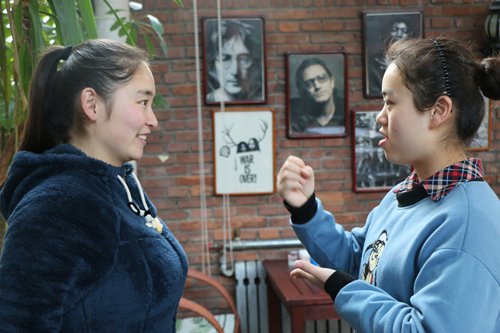
Two employees at the Mina Restaurant in the Tongzhou district, Beijing (Photo/GT)
It was a chilly but bright and sunny November morning, a respite after days of the typical gray and heavy haze for which Beijing has become famous, when I visited the Mina Restaurant.
On such rare and beautiful days people tend to go out for a breath of fresh air, so while it was not yet noon almost all the seats had already been taken.
The delicious food is not the only thing that will surprise you at this artsy suburban Tongzhou restaurant - it is the first restaurant in Beijing to exclusively hire deaf employees for its waiting staff.
Converted and renovated from a traditional northern Chinese farmhouse, Mina possesses a light and airy atmosphere with its exposed brick walls, large glass skylight covering the main dining area and rows of bamboo and other plants.
Framed pictures of John Lennon and Yoko Ono, as well as other Western avant-garde artists hang on the walls. This artistic atmosphere mixes nicely with the yummy aroma of Sichuan cuisine, the restaurant's highly rated specialty.
A smile is worth a thousand words
"We now have about 15 waiters and waitresses in the restaurant who are both deaf and mute," Su Qing, owner of the Mina restaurant and an independent documentary film director, told the Global Times on Monday.
Su's brother Su Menglun, who is four years older than him, is deaf. Growing up in North China's Inner Mongolia Autonomous Region, Su was taught sign language at a very early age so he could talk with his brother.
"I have a very deep personal affection for this group. When I am with them, I feel very warm and comfortable. Because my sign language is very good, people sometimes think I'm deaf too. I want to be part of them and I like working with them." Su said.
After working at an advertising company in Southeast China's Chongqing for a few years, he came to Beijing to pursue his dream to become a documentary filmmaker.
Early on in 2002, he started to make documentaries about deaf people in China. He and his wife Mi Na's first documentary film White Tower won the Premier Prize at the 15th Marseille International Film Festival in 2004. In 2010, they made another film, Sign Language Time, which currently holds a 7.3/10 on China's leading film site, douban.com.
Both films delve into the lives of deaf people in China, examining the difficulties they face and their dreams.
When they decided to open up a restaurant in 2008, they also decided to hire young, educated deaf people for their waiting staff.
It was a tough decision, since no one at the time knew how to approach the problem of running a restaurant with a waiting staff who could neither hear customers nor speak to them.
Even though the entire staff is literate and can write, and some of them can read lips, there were still communication problems. For example, when a customer orders a bottle of beer and wants it to be very cold, he can either write it down in the server's notebook or use gestures and body language, but sometimes servers misunderstand and bring something else to the customer.
This difficulty in communication left some of the staff feeling hurt. At times like these, Su would encourage them, "It's not your fault that you cannot hear, you should try to explore other ways to communicate with people. A smile is the best form of language."
"I like their smiles, so sincere and genuine. They pay very close attention to customers and respond very quickly to their needs," one diner told the Global Times.
Breaking barriers
Chen Fangfang, a young deaf woman from East China's Jiangxi Province, has been working at Mina since 2008. Previously, she was a dancer who performed with the nationally famous dance group The Thousand-hand Bodhisattva all over China.
"I spent many years dancing on stage. Our troupe had to travel all the time. After I had my first baby, I wanted to settle down somewhere with a stable and suitable job. I got a job as a waitress in Mina and I love it here. This restaurant is like my second home," Chen typed out on her smartphone.
Ye Xiaoling, a 22-year-old woman also from Jiangxi Province, was born deaf. Her parents sent her to school very late. At the age of 14, she was taking classes with students who were only 7 or 8 years old.
Her reading ability wasn't as strong as other employees at the restaurant when she first started, so Su asked her to keep a daily diary. Now she is able to write quickly and read without much difficulty.
"The biggest problem for deaf people in China is that it is very hard for them to find jobs due to the language they use. The percentage of people in China who can understand and use sign language is very small," Su explained.
"There is a natural barrier between people who sign and those that use sound. I hope in the future there will be more language centers in China that can promote and teach sign language to solve the communication problem between the deaf and society."
In its first two years, the restaurant was losing money, but slowly it began to take off and is now one of the highest-rated Sichuan restaurants in Beijing with a 4.5/5 on restaurant review website dianping.com.
There are two secrets behind the success of Mina, its food attracts people, while warm smiles connect people.


















































